| PRINTING ON WOOD |
 |
| The growing demand for unique, artistic reproductions of photographs has led to a number of exciting options for consumers. Prints on canvas, metal, and glass ensure the customer receives exactly the look and feel they want with every print. Wood Prints are another great option. Much like the other choices, there are a variety of ways to display an image on wood.
Prints can be heat-mounted on medium density fiberboard (MDF) and laminated for a clean, frameless look that retains the color of the original image. Printing directly to a smooth sheet of wood offers a unique appearance with warmer tones and visible wood grain. Alternately, dye-sublimation involves printing the image on transfer paper with a special type of ink, then infusing the picture into the wood using a heat press.
Whatever your desired product, there is a wood print for you. Check out the table below, summarizing the options, then read on for an in-depth look at each.
|
SUMMARY
| SUMMARY |
DRY-MOUNTING ON WOOD |
DIRECT PRINT TO WOOD |
DYE-INFUSED WOOD IMAGING |
| HOW IT WORKS |
A paper or canvas print is attached to an MDF wood backing using a process called dry mounting. |
The digital image is printed directly onto the wood base using a flatbed printer. |
The digital image is printed on transfer paper, then infused into the wood panel using a heat press. |
| MAXIMUM SIZE |
Subject to the surface area of the heat press, up to 40x60". |
Subject to the surface area of the flatbed printer. |
Subject to the surface area of the heat press, up to 40x60". |
| AVAILABLE SHAPES |
Primarily square and rectangular shapes. |
Primarily square and rectangular shapes. |
A wide variety of shapes, from square, to circular, to arches or ogee edges. |
| QUALITY |
The paper/canvas print is available in archival quality; the laminate prevents the paper from detatching from the wood. |
UV-resistant inks and the rigid wood substrate result in long-lasting prints. |
Inks are UV-resistant, and wood has been shown to last for many decates. |
| FINISHES |
Determined by substrate choice (paper, fabric, canvas); a matte lamination will affect the finish. Many edge colors are available. |
No options, image will show the wood grain through whites and lighter colors. |
Depending on the saturation of the ink, the wood grain may show through whites and lighter colors. |
|
| PRINTS DRY-MOUNTED ON WOOD
|
 |
The Process
Essentially an alternative to ink placed directly on wood, mounting prints onto wood panels begins with an image printed on paper. Created from a digital file with a high-quality inkjet printer at 300 DPI (dots per inch), this image is then affixed to the MDF panel using a dry-mounting procedure. The finished product is also called a Plaque Mount.
MDF stands for medium density fiberboard, and is made by contensing a mixture of left-over wood fibers, wax, and a resin binder with extremely high pressure and heat. Denser than plywood and particle board, because MDF has no real wood grain, it cannot break along the grain. MDF is made from recycled materials, and is recycleable.
A piece of mounting tissue (a very thin, heat-sensitive adhesive) is placed between the printed image and the wood panel. When squeezed within a heat press, the print adheres completely to the wood. A UV-resistant, matte laminate is then applied to the surface to protect the image from scratches, temperature changes and fading.
Shapes and Sizes
The most common shape of wood panel for a dry mount is square or rectangle. The edges of the board are neatly bevelled, serving as a subtle decoration around the image. At KeenART Media, we offer dry mounts on wood in any size up to 48x72".
Finishes
The bevelled edges of the wood panel can be painted in a wide variety of colors, from muted black to eye-catching gold. The stippled texture of the board is visible beneath the paint.
Several display options are also available for plaque mounts. All options have a routed keyhole slot for easy hanging.
- Standard/Flat Mount: The image is displayed on a on a basic, 1/2" deep panel from edge to edge, with a bevelled border.
- Matted Mount: The wood panel is cut larger than the image, so a border in any color is visible around the picture. This border serves as a mat, and can be any width the customer chooses.
- Raised/Combo Mount: The panel containing the image is layed onto another, larger panel in a solid color, which serves as a recessed mat. Both panels have a bevelled edge that can be painted in any color.
- Box/Flush Mount: Similar to a standard or flat mount, but the panel is thicker, with a depth of 1". The matted mount option is also available for this style.
- Float Mount: a thick, 1" board is affixed to the center back of the 1/4" panel on which the image is mounted. The back piece pushes the image out from the wall, giving it a floating effect.
The type of paper onto which the image was printed will affect the finish of the product, as well. Any photographic papers can be used, as well as smooth or textured fine art papers. Even satin cloth and real canvas can be used for a completely unique visual texture. The matte laminate will give a matte finish to any substrate, but the original qualities of the substrate will still be seen to some extent.
Quality and Durability
The inkjet printer will create a high quality print with colors as closely matched to the original as possible, with UV-resistant, archival ink. Depending on the choice of substrate, the print will resist fading and discoloration for decades, even over 100 years. The laminate protects the print further, from scratches and nicks, as well as fading due to light exposure, and moisture. It also ensures the print will stay tightly affixed to the wood for years to come.
The wood panel is not archival, but is of a good quality and will hold up for many years. It is important to note, however, that the wood itself will absorb moisture, so it is best to keep the plaque mount out of humid areas, unless a protective coating or resin is applied to the wood.
|
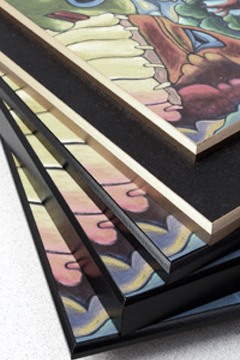
Plaque mount styles
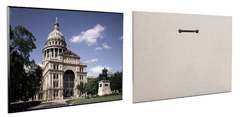
A standard plaque mount and keyhole hanger.
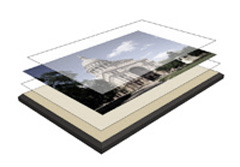
Panel, mounting tissue, image, laminate.
|
| DIRECT PRINT ON WOOD
|
 |
The Process
Using a flatbed printer (the substrate is not rolled or bent - the printer head moves instead of the substrate, or the substrate lies on a moving bed), a digital image is printed directly onto a smoothly sanded board of real, solid wood (birch is common) that is treated with ink-receptive coating. Because the substrate is the not white, but a rich, wood color, areas of white and less saturation allow the natural appearance of the wood to show through. The result is a warmer color palate accented by a beautiful grain.
Direct prints on wood cannot, and are not intended to, be identical to the original digital image. Rather, they are an artistic reimagining that results in a unique, eye-catching display. Since no wood board has the same grain pattern, each and every print is completely unique.
Shapes and Sizes
Rectangular and square shapes are most common for these wood prints, but some print shops may stock other shapes such as oval or ogee edged. Size is limited by the dimensions of the printer bed, which can be as large as 8 feet long.
Finishes
Because the surface of the wood board is not white (like paper or canvas) and the printers generally do not use white ink, any whites in the original image will instead be the soft, warm color of the wood grain, and the grain will also show subtly through lighter colors.
Depending on where the wood print is created, hanging hardware may involve a two float mounted panels on the back, between which wire is strung. Alternately, a keyhole slot may be routed into the back of the printed panel, for easy mounting.
Quality and Durability
The solid wood used in these prints is high quality and extremely durable. The print should not warp or splinter. Certain processed may be applied to make the wood both heat and moisture resistant. The print should retain its original appearance for decades.
Since there is no paper or canvas surface on top of the metal, the inks will stay affixed to the surface indefinitely. The inks are usually UV-resistant, which means they should not fade from light exposure over time.
|
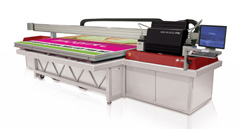
Flatbed Printer
|
The Process
For this wood print option, a special printer and transfer paper must be used. The dye-sublimation printer uses special inks (usually water-based, though solvent-based inks are available as well), and often has a clear laminate coating as well, which applies a protective layer as it is printing. Once printed, the inks on the transfer paper are infused into the board, as opposed to simply being printed onto the surface.
Dye-sublimation printers are known for producing "truer" color tones than some inkjet printers, though the image can be slightly less sharp due to some diffusion before they are absorbed by the paper. This suits photographs perfectly, but can be detrimental to digital designs. The prints are dry and ready to transfer as soon as they exit the printer.
Once the image has been printed on the transfer paper, it is laid face down on the solid wood or wood veneer panel. When pressure is applied by a heat press, the ink transfers from the paper to the wood. The result is a bold, photographic print with the natural wood color replacing any white or lighter colors in the image, and a warmer "woody" tone throughout.
Shapes and Sizes
Because the image is being pressed onto the wood, these prints offer a wide selection of shapes. Wavy-edged rectangular and square panels are available in addition to straight-edged, as well as circular, ogee, arched, and more. Both hardboard and natural, solid wood boards can be used.
Size is limited by the dimensions of the heat press, as even pressure must be applied to transfer the ink. Many press sizes are available, though larger print shops will have presses as large as 40"x60'.
Finishes
The board will have been treated with a scratch resistant coating prior to applying the image. The laminate coating applied along with the inks will also help to protect the image.
Keyhole hanger will be cut into the back of the wood panel for easy wall display. Alternately, smaller prints include an easel back so the image can be shown on the mantel or desktop.
Quality and Durability
The prints produced by dye-sublimation are scratch-proof and water-proof, and the protected ink guards from UV damage as well. The wood boards are perfectly flat, and will not warp. Since the inks are imprinted directly into the wood, the image will never peel at the edges, or bubble in the center. Since the piece is not framed, there is no danger of a damaged frame or broken glass.
|
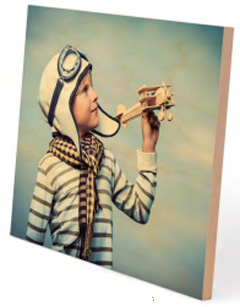
Rich colors and visible wood grain.
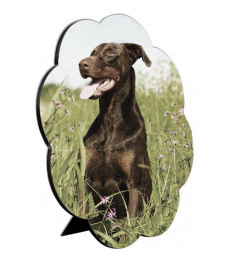
A unique, "bloom" edged shape.
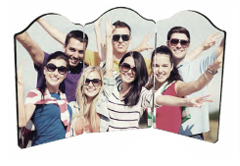
An arch-edged triptych collage.
|
| Each of the above options outlines a modern, stylish way to display your image. Whether you choose to have your image dry mounted onto a fiberboard panel (great for creating a desired texture due to substrate options), directly printed onto wood (for an artistic version of your original), or transferred to and infused within a solid wood panel (for a long lasting, authentic effect), you are sure to end up with a one-of-a-kind artwork that will enhance the beauty of your home.
Upload your images/artworks:

|
|
© 2002-2026 - KeenART Media Ltd.
|
|
| |
|

